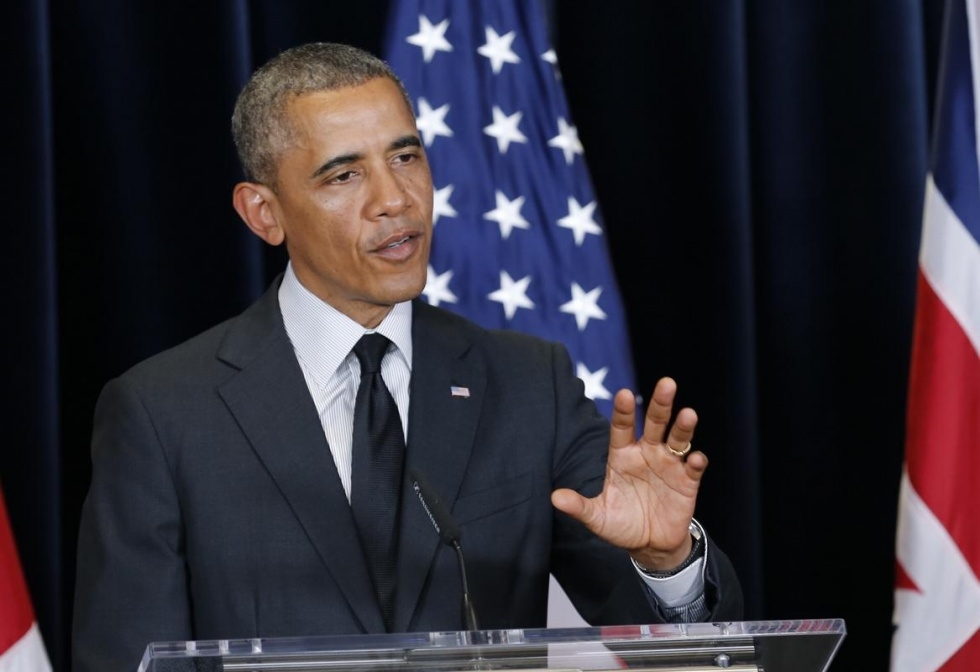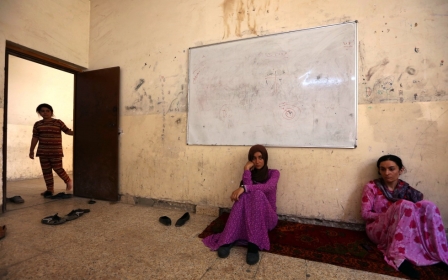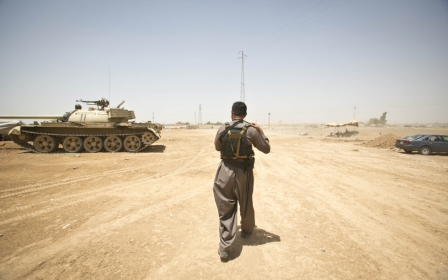US mulls military intervention in Iraq as IS make gains

US President Barack Obama is mulling military action to help civilians and particularly minorities, ravaged by onslaught of Islamic State militants.
President Obama on Thursday assembled members of his national security team to discuss the unfolding humanitarian catastrophe, which has displaced tens or thousands of Iraqis in the last few days.
More than half a million were already displaced before the latest upswing in violence, which has seen IS make inroads into northern Iraq, which had come under Iraqi Kurdish control after IS first launched a Sunni offensive against Baghdad in early June.
The US is considering airdrops of humanitarian assistance supplies to Yazidis trapped at the top of Mount Sinjar, as well as airstrikes and other “military options,” according to The Washington Post.
An administration official said that “the president is weighing both passive and active options.” Dropping humanitarian supplies is considered passive action. “More active, we could target the [IS] elements that are besieging the base of the mountain,” the official added.
Reports also circulated that the Obama administration was considering airstrikes against IS strongholds, although the White House has thus far stayed tight lipped on the matter.
“The United States government, as well as the United States military, is supporting the ongoing efforts of Iraqi official and Kurdish officials to address” this humanitarian crisis, White House press secretary Josh Earnest said Thursday.
The heightened US response comes after IS made large gains overnight, capturing Iraq's largest Christian town Qaraqosh earlier in the day. The group then pushed into Makhmour, a town closer to the autonomous Kurdish border which is home to a significant Turkish Kurdish population.
Qaraqosh, is Iraq's largest Christian city, with as many as 50,000 residents reportedly fleeing the IS advance. Many resident of surrounding towns such as Bartella and Tel Kayf also fled north, fearing these pockets would soon fall.
Middle East Eye reporters, who had tried to gain access to the town early this morning, were turned away by Kurdish forces who told them that IS was now in control of the area.
“This morning at least a thousand cars were lined up at the Iraqi Kurdistan border, waiting at the checkpoint to enter the relative safety of Iraq's Kurdish Autonomous region,” MEE reporter Sheren Khalel said.
“People, arrived at the checkpoint on foot, lined the road under the baking sun, sitting on the few belongings they were able to drag as they fled. Some literally only had the clothes on their backs.”
Khazir, the UNHCR camp near the checkpoint had already reached capacity as thousands more internally displaces, continued to pour north.
"Qaraqosh, Tal Kayf, Bartella and Karamlesh have been emptied of their original population and are now under the control of the militants," Joseph Thomas, the Chaldean Catholic archbishop of Kirkuk and Sulaimaniyah, told AFP.
Violence also gripped other parts of the country, with a car bomb ripped through a Shiite mosque in the Kurdish-controlled Iraqi city of Kirkuk on Thursday, killing seven and wounding 37, according to local medical sources.
The capital Baghdad was similarly rocked by a series of bomb blasts late on Wednesday that killed 51 people in predominantly Shiite neighbourhoods.
UN meets on crisis
The upswing in fighting had prompted France to call for an emergency UN Security Council meeting on the issue. A closed door meeting took place, before news broke about a possible US intervention.
"France is very deeply concerned by the latest advances of [IS militants] in the north of Iraq and the taking of Qaraqosh, the biggest Christian city in Iraq, as well as by the intolerable abuses that were committed," France’s foreign minister, Laurent Fabius said in a statement.
"Given the seriousness of the situation - the first victims of which are civilians and religious minorities - France is requesting an urgent meeting of the Security Council so the international community can mobilise to counter the terrorist threat in Iraq and support and protect the population at risk."
Qaraqosh lies between Mosul, where IS has its key Iraq base, and Erbil, the Kurdish region's capital. It usually has a population of around 50,000.
Tal Kayf, the home of a significant Christian community as well as members of the Shabak Shiite minority, also emptied overnight.
Chaldean Patriarch Louis Sako, who heads Iraq's largest Christian denomination, said the overnight offensive had displaced 100,000 Christians, although these numbers have not been independently verified.
"Tal Kayf is now in the hands of the Islamic State. They faced no resistance and rolled in just after midnight," Boutros Sargon, a resident who fled and was reached by phone in Erbil, told AFP.
"I heard some gunshots last night and, when I looked outside, I saw a military convoy from the Islamic State... shouting 'Allahu Akbar' [God is greatest]."
Pope Francis urged the international community to protect Iraq's Christians.
Toby Dodge, director of the Middle East Centre at the London School of Economics, said he wasn’t surprised by the IS drift northwards.
“It was always a mystery why they [IS] went south,” Dodge told the Middle East Eye. “They are opportunistic. They pushed as far south as they could and now they’ve redoubled their efforts and pushing north and northwest.”
Without a militia, the community in Sinjar is one of the most vulnerable in Iraq, and an easy target as IS continues an advance which says more about the weakness of the Iraqi state than the power of the group, he said.
Estimates released on Thursday indicate that the group has swollen to around 20,000, likely including many opportunists who have joined up because the group is “at the cutting edge as it were,” Dodge said.
Even if Iraqi Prime Minister Nuri al-Maliki is replaced, as looks increasingly probable, rebuilding the state will be tricky and IS’s exploitation of the country’s weaknesses is likely to continue, he said.
The news of the IS offensive comes just days after the militant group began a crackdown on Iraq's Yazidi population, sending tens of thousands fleeing into the mountains. According to Iraqi officials, some 500 Yazidis have been killed in the offensive during the last week.
Up to 800 Yazidis are believed to have made it to Turkey on Thursday, although tens of thousands remain trapped in Iraq’s mountainous regions with little access to food, water or shelter.
"They have been accommodated by the local authorities in a housing complex for earthquake victims in the town of Silopi near the Iraqi border," a government source told AFP on the condition of anonymity.
New MEE newsletter: Jerusalem Dispatch
Sign up to get the latest insights and analysis on Israel-Palestine, alongside Turkey Unpacked and other MEE newsletters
Middle East Eye delivers independent and unrivalled coverage and analysis of the Middle East, North Africa and beyond. To learn more about republishing this content and the associated fees, please fill out this form. More about MEE can be found here.




